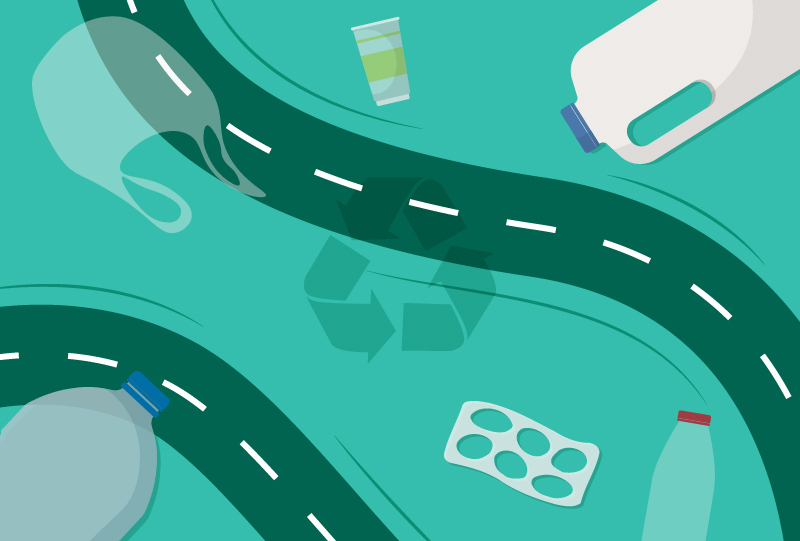More and more roads are being made of recycled plastic, an innovation that helps to preserve the environment by re-using plastic waste from households and other sources.
This technology has only recently emerged, yet it has already shown clear advantages such as a better grip and a lower cost.
In developing countries, in particular, asphalts made from recycled plastic are proving to be an excellent solution, as they allow large quantities of waste to be recovered, which in some parts of the world, unfortunately, remains a difficult problem to solve.
We are only at the start and there is still much research to be done, however, it is undoubtedly one of the most significant innovations in terms of recycling large quantities of plastic waste and preventing it from being dispersed into the environment while creating essential infrastructures, with characteristics that are proving to be both technically and economically beneficial.
Other important data will be available thanks to continuous research, studies and experimentation, including the wear and tear of roads made of recycled plastic and the results of tests concerning long-term durability. In addition, these asphalts currently contain a rather low percentage of recycled plastic compared to other components, such as aggregates (sand, limestone, etc.) and bitumen, which is currently replaced by about 5-10% recycled plastic.
Nevertheless, we need to bear in mind the very substantial amount of plastic waste that is used: for every tonne of asphalt, between 3 and 10 kilos of plastic waste are used!
Michael Burrow, an engineer at the University of Birmingham and the author of an in-depth study on this technology, stated that using asphalts containing recycled plastic helps “to improve the stability, resistance, durability and other useful properties of bituminous mixtures, leading to the increased longevity and improved performance of road surfaces”.
We will certainly have more reliable data over time.
Recycled plastic roads: Where can they be found?
From Italy to the Netherlands, India and the UK, here are the countries where you can travel on asphalts made from recycled plastic waste!
India
In India, roads made of recycled plastic have a history spanning 20 years! More than 100,000 kilometres of roads made of recycled plastic asphalt have already been built in India, starting with the city of Bangalore. During these years, all the advantages and characteristics, such as improved grip and reduced maintenance costs, have therefore been tested.
Italy
In Italy, several projects have already been launched involving recycled plastic asphalt as the main material.
The company Mapei has used recycled plastic for paving several airports, including Marco Polo airport in Venice. Also in this case, thanks to a partnership with Milan Polytechnic, some important characteristics of these new asphalts have been analysed. These include improved resistance to heat, low temperatures and UV rays, demonstrating a significant reduction in the formation of dangerous potholes over time, thus contributing not only to greater sustainability but also to a reduction in risks for users.
Thanks to Milan Polytechnic, combinations are also being identified to produce higher-performance asphalts with increased durability for use in different contexts, including roads, motorways, commercial and industrial spaces.
Ecopave is also an all-Italian project by the company Iterchimica. Created in 2017, it involves the construction of roads made of graphene and 100% recycled plastic. It was tested for the first time on the Ardeatina road in Rome in 2019.
Netherlands
The PlasticRoad project has been in operation since 2015. The main feature of this road is its internal cavity, which allows it to collect rainwater. Also tested for improved resistance to temperature fluctuations, it lasts 3 times longer than conventional asphalts, is much quicker to build and has reduced CO2 emissions.
Cycle paths made of recycled plastic have already been built in Zwolle and Giethoorn in the Netherlands.
UK
In Edinburgh, the company MacRebur tested asphalt made from household, commercial and agricultural plastic waste. It consists of recycled plastic pellets that replace bitumen, which is much more polluting. The UK government is planning to use it in different areas.
Roads made of recycled plastic are also being tested in the UK capital, again using it as a bonding agent instead of bitumen. For now, the experiment has been launched in the Enfield area of London, where about 500,000 plastic bottles have been used to make asphalt, with the support of the company Transport of London.
South Africa
The company Shisalanga Construction has undertaken to find a solution for both the large amount of waste and the low quality of roads by constructing several sections of road in the country using recycled plastic. This initial experiment has already been a great success and will certainly be repeated in many areas of the country.
And more…
Many cities around the world have decided to participate in this important experiment. One of the most recent news stories concerns Los Angeles, where the local authorities have announced the construction of new roads made of recycled plastic. This large-scale project, in partnership with the company TechniSoil Industrial, will allow the city bus lanes to be renewed in a more sustainable way!
At Are you R, we love recycled plastic roads because they combine two fundamental aspects of recycling, which are facilitated by major technological progresses: the benefit to the environment, with a reduction in the spread of plastic waste, and the functional aspect that helps people by building infrastructures for everyday use, as well as the outstanding contribution made to the circular economy.
We look forward to seeing the progress made over time. Stay with us, we will tell you all the news about recycled plastic roads!

